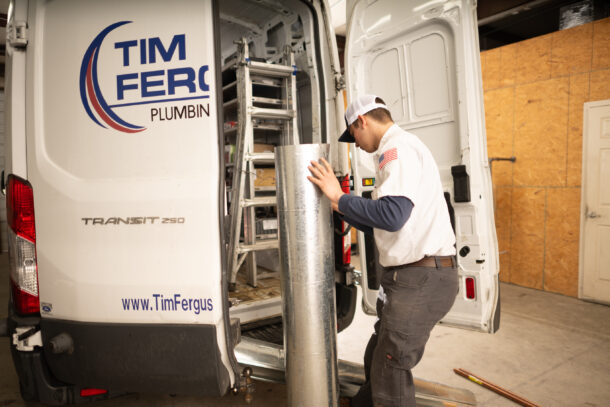By Jacob Hamilton, General Manager at Tim Ferguson Plumbing, Air & Electric
When my father-in-law called me into his office on an afternoon in 2010, I didn’t know my life was about to change.
I had been working as a nurse before joining his plumbing business, Tim Ferguson Plumbing, Air & Electric, jumping headfirst into a new industry I knew nothing about. But Tim trusted me to learn and saw something in me then that I couldn’t see in myself.
During our meeting, he laid out his plan for me: He wanted me to help continue to build the family business and take over when he retired. I told him I knew nothing about how to run a company; but I could sense he had complete confidence in my ability to learn. And I knew that, if he believed in me, for something as important as leading the family business into a new generation, I should trust his plan.

Tim Ferguson
It was Tim’s foresight and commitment to long-term planning that made his dream come to fruition when he sold the company to Leap Partners and retired. I took over on Oct. 1, 2023.
Leadership transitions are hard. But it was Tim’s patience and long-term planning that helped us all smoothly transition with minimal disruption. His intuition also prepared our 45 employees and me to easily and naturally transition into a new era and continue the legacy he’d built over more than 20 years.
How did we do it? Let me share some lessons we learned along the way.
Communicate, communicate, communicate
Without question, the most important piece of advice I can give to anyone undergoing a leadership transition is to communicate consistently. It’s imperative that you communicate clearly and often with your employees about your plans for leadership. You don’t want employees to fill in gaps with hearsay, and you definitely don’t want them to hear two conflicting or muddled messages at the same time. Overcommunicating is always going to be better than not communicating enough.
Let them know the plan, when it’s happening and how you expect the transition to go. If you don’t know the answers to some of these questions, let them know that too. Listening to feedback and being transparent will help cut down on the feeling of unease that can come with change. Treating all employees like integral partners in the business by being overly transparent with them can make everyone feel invested in what’s happening. Especially with small businesses, your team should feel comfortable with the transition and feel that their input is being considered.
Anticipate challenges and plan for them
How am I going to deal with the potential of losing managers or technicians? What if people don’t like the new leader? When should we change over? These are all normal questions to have, and it’s crucial to fully think through the answers before any plan is put into action.
Run through every scenario in your head and create a rational plan for each. Find the solution that will have the smallest impact on your business, and make sure you consult with your leadership team for feedback.
An aspect that is often overlooked is the timing of your transition. As best you can, try to implement your transition plan during a time of year that’s comfortable or slower for your industry. In our business, we know summers are often draining on our employees, so we looked at September or October to start transitioning duties rather than during the intensive summer period.
Give thought to potential pitfalls, and make sure you plan accordingly so you don’t panic when they arise.

It’s never too early to start planning
A lot of the success in Tim’s transition plan was due to his foresight and patience. Just as he did with me for the better part of a decade, I’m looking ahead and thinking about how I can prepare the next generation of company leaders.
There are many aspects to leading a business that you have to just learn in the role, but there are other skills that come naturally to any good leader. Identify those rising leaders with exceptional listening skills, emotional intelligence and strategic foresight. Engage them in tasks that foster the development of these skills and provide leadership opportunities where you can, preparing them for larger future roles.
Starting this process early will save you time and potential headaches down the road. If you’re not sure where to start, don’t be afraid to ask for help. We had the support of our parent company Leap Partners to help guide us through our transition, and their advice and helping hand were vital to our success.
A smooth transition of leadership does not happen overnight. It requires detailed planning and strong communication. It’s what Tim did for our company 14 years ago, and I thank him every day for it. By laying the groundwork years ago, he paved the way for a seamless transition and made it easier for me to keep his business growing and successful.
There’s time for you to put in the same work. Your future business will thank you for the time you put in today.
 Jacob Hamilton is general manager at Tim Ferguson Plumbing, Air & Electric, a member of the Leap Partners family, operating across Western Tennessee.
Jacob Hamilton is general manager at Tim Ferguson Plumbing, Air & Electric, a member of the Leap Partners family, operating across Western Tennessee.




Join the conversation: